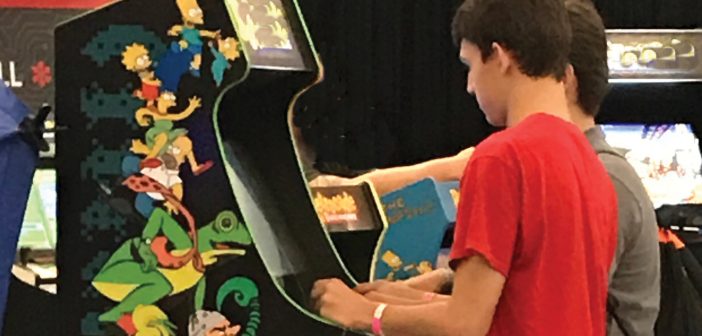Copy Retro Games in the News
Why Aren’t More Copyright Holders Going After These Guys?

Jack Guarnieri
by Jack Guarnieri, Jersey Jack Pinball & PinballSales.com
Fake news, fake jewelry, fake Pac-Man games…seems like the whole world is fake sometimes. A recent article on the New York Post’s website (quickly making the social media and news rounds) reported that the owner and employees of CoinOpStore in Santa Clara, California, allegedly made and sold counterfeit video games. It specifically mentioned Galaga and at least five iterations of Pac-Man that were featured in multi-game cabinets, according to the Santa Clara County District Attorney’s office.
I was at a recent game show in Pittsburgh, ReplayFX, where it seemed that these type of games were offered for sale in several booths. The side graphics of the cabinet mixed all kinds of game characters together (see the picture). I’ve often wondered how these people could be so brazen to offer these games to the public.
On my www.PinballSales.com site, we sell Arcade Legends, a fully licensed product for home use built by Chicago Gaming. Since they were introduced years ago, we’ve sold hundreds of them. We also sell licensed Ms. Pac-Man from Chicago Gaming, as well as offerings from Bandai Namco as a factory authorized distributor.
The other reportedly bootleg video games are being offered on eBay, Amazon and countless other websites. Some cabinets are 60-games-in-one, some have 412 games and there are others with thousands of games. How are they being offered in plain sight on reputable websites if they are reportedly illegal? It really doesn’t matter if they’re being sold to homeowners for their own rec rooms or if the intent is to operate them for profit. If they’re illegal, they’re illegal. Certainly the companies who own the intellectual property would report them as counterfeit and have these auctions and listings pulled down, right?
Of course, some license holders are more vigilant than others about getting violating content pulled down from retail websites and no longer sold. Others may allow reported violators to make sales, seemingly to give the offenders enough rope to hang themselves. This may be the case with the people mentioned in the New York Post article. It cites that if the alleged charges are proven true, the offenders could lose more than a million dollars and all kinds of property.
Why do this if you know it violates copyright law? I imagine a good number of people think: “I’ll never get caught,” “Everyone else is selling them,” “I didn’t know it was illegal,” “Those companies made enough money off of Pac-Man and Donkey Kong already,” and “Who will ever find out that I did this?” Just search Google and you’ll find many sites and you’ll see some legitimate coin-op sellers mixed in with a good number of “who knows” retailers. How does the prospective buyer know if the game is legit and has licensed content or if it’s an illegal copy, especially if the seller is advertising on reputable sites such as eBay and Amazon? I’m not a lawyer and can’t say whose product could be legal, but I can tell you I came away from such a search really scratching my head.
If you look online as most people do before they make a purchase, you’ll see that a licensed Ms. Pac-man/Galaga upright arcade game with a 24” monitor built by Chicago Gaming sells for around $2,999. I look a bit more and find a similar game for $2,499 with free shipping with a description that reads: Authentic Upright Arcade Machine. 21” Viewable Military Grade LCD Arcade Monitor for incredible game play. Popular Licensed Game Packages includes games like Pac-Man, Ms. Pac-Man, Galaga, Dig Dug, Donkey Kong, Centipede, Space Invaders, Frogger and many others!”
Really?
Why buy a machine with two or three games when you can buy one with dozens of games, cheaper and with free shipping? Some of these websites list ten or more offices throughout the United States. They are all mailbox “offices” with different phone numbers, all to give the appearance that the potential buyer is dealing with a legitimate business.
It seems some sites advertise that their game has genuine Namco or other circuit boards that were used in legitimate, authorized retro games commercially sold years ago. While this is possible for a few games, it’s not possible in the volume being offered. My guess is that many of those boards were copied and remade to look exactly like the authorized circuit board.
There are “MAME” games, too. “Multiple Arcade Machine Emulator” is an open source and free emulator that was designed to recreate the games in other platforms. It is widely believed that if a private individual owns the game ROMs with the game program, that person –– for their own use –– can transfer the game program to their own personal computer for the purpose of preserving the game and, as an added bonus, emulate the program and play the game. Some websites sell these copied ROMs illegally and it gets into a sticky mess, but in no way is it legal for commercial use.
There are some companies that build games with some legal content, but then they direct buyers to websites where other games can be downloaded. Games like Ms. Pac-Man, Galaga, Frogger, Donkey Kong, 1942 and many more. Some lazy sellers actually download the content for the buyers and sell it to them fully loaded –– and fully illegal.
Some of these companies display their games at swap meets and amusement trade shows. The assumption is that if the games are being displayed at trade shows and sold on eBay and Amazon, they must be legal. I’m not trying to paint with too broad a brush, but, for the most part, they are not. If the price is too good and the list of games is too long, chances are the game is a knockoff. I’ve walked into reputable billiard and home game room stores and I’ve seen these type of games offered for sale.
Upon asking questions, I’ve been told every time that the games are, in fact, legal and I usually get the response: “Well, the game is here on our showroom floor. If it were illegal we’d know about it.” Years ago, industry crusader and defender of all things right, Bob Fay, traveled the globe to educate our industry and to eradicate copy games. Now it seems like it’s 1985 all over again.
For years, I received calls asking me why the Ms. Pac-man game on our website was so expensive when other sites sold it loaded with many other games. I would explain that there was no way those games could legally be bundled together and that the seller was probably engaged in selling something unauthorized. I lost scores of sales with that explanation. I wonder how many thousands more legal games could have been sold by companies such as Bandai Namco, Nintendo and Chicago Gaming if more of the offending companies had been shut down.
Buyers say things like “Nobody is coming to my basement to see if the game is legal or not” or “It’s only my kids playing the game, not an arcade in a mall.” Saving money seems to win over doing the right thing almost every time. Copyright infringement of games, just like with movies, is seen as a victimless crime. It’s not.
By the way, in preparation for this column, I emailed several sellers of these multi games on Amazon and on eBay. My question was simple: “Before I buy this item, can you show me some form of license agreement from the publishers of the games you have loaded in the machine you are selling?” Now, who would really ask that other than someone who already knows the answer? Of course, so far I haven’t gotten any replies.
Jack Guarnieri started servicing electro-mechanical pinball machines in 1975 and has been involved in every phase of the amusement game business since then. He was an operator in NYC, then began a distributorship in 1999, PinballSales.com, selling coin-op to the consumer market. In January of 2011 he founded Jersey Jack Pinball (named after his RePlay Magazine pen name), which builds award-winning, full-featured, coin-op pinball machines. Email Jack at jack@ jerseyjackpinball.com.




